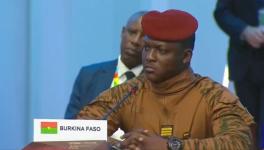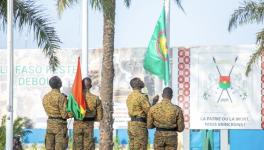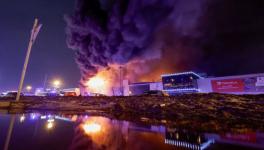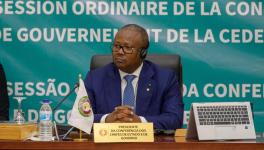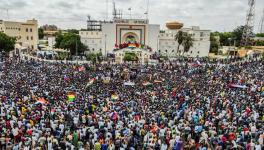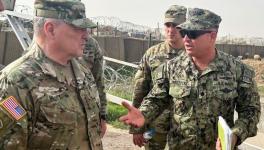Nigeria: Govt Losing Ground to Resurgent Boko Haram, IS-Linked Splinter
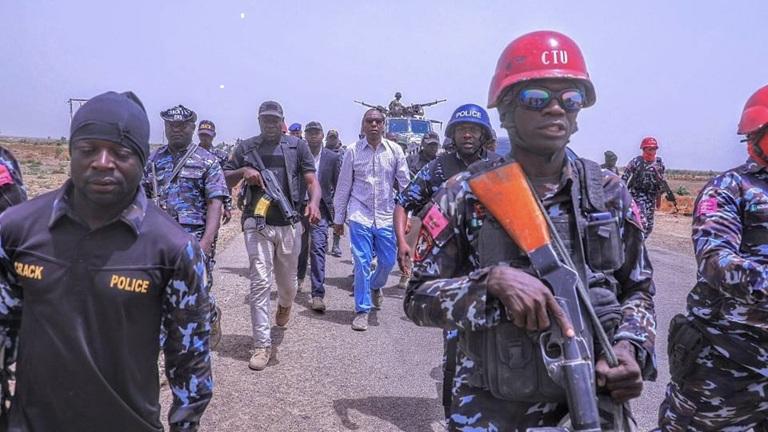
Borno State Governor, Babagana Umara Zulum visiting Wulgo town which was affected by a Boko Haram attack. Photo: Borno State
Amid a series of attacks in Nigeria’s northeastern border state of Borno, its governor, Babagana Zulum, sounded an alarm that only one of the over 300 towns and villages in its Marte Local Government Area (LGA) remains under government control.
Several other of the 27 LGAs of the state have also been attacked this year, especially since March. The attackers? A resurgent Boko Haram and its splinter, the Islamic State of West Africa Province (ISWAP).
Past midnight on May 23, Boko Haram gunmen were intercepted by the army while trying to infiltrate a brigade’s headquarters in the Damboa LGA. In the two-hour-long battle that ensued, two soldiers and 16 militants were reportedly killed before the latter retreated.
The night before, around 10:30 pm on May 22, the army killed five more terrorists while repelling an attack on a military base in Gajibo village of the Dikwa LGA. The gunmen also opened fire on civilians in the village, killing at least nine and injuring many more.
Dozens more civilians were executed last week in the Kukawa LGA, where a Boko Haram faction’s gunmen reportedly rounded up over a hundred residents, mostly bean farmers and fishermen, in the village of Malam Karanti and its neighboring Kwatandashi on May 15. They were marched into a bush where 57 bodies, most of them with slit throats, were recovered two days later.
Rivalry and cooperation between Boko Haram and ISWAP
Local media reports and eyewitness accounts that Boko Haram attacked these villagers for paying protection money to its rival ISWAP highlight that civilians remain the victims even when the conflict is within the Jihadist movement.
ISWAP was formed in 2016 and affiliated itself with the Islamic State after it broke away from Boko Haram which formed in 2002. In 2009, Boko Haram unleashed a terror campaign, which continues till today, killing 36,000 people and displacing another 2.2 million. Clashes between these two rivals have also been reported. Nevertheless, the Nigerian government is losing ground again to the Jihadists, even as they fight each other.
Their rivalry and collaboration appear to be separated by a thin and often blurred line. Nigerian media attributes several attacks to “Boko Haram/ISWAP”, including the attack on Gajibo on May 22 and the earlier coordinated raids between May 12 and 13 on the two military bases – one in Rann in Kala Balge LGA, and another in Gajiram in the Nganzai LGA.
Vanguard reported that five soldiers were killed and six others were injured in Rann, while the army was able to repel the attack in Gajiram – both of which have come under repeated attacks this year.
Earlier on May 12, gunmen had also struck another military base in Marte town in Marte LGA on the border with Cameroon, killing seven soldiers and dislodging others before stealing weapons. After the base was briefly overrun, 20,000 people fled the town to take refuge in an Internally Displaced People (IDP) camp in Dikwa LGA’s town.
“This huge number is a threat as allowing them to stay in the camp may” leave “the younger ones… vulnerable to recruitment by the insurgents,” Governor Zulum warned.
Reassured by his visit to the town with security forces in the aftermath of this attack, many of the residents have returned, and are now “resettled for the second time,” he said in a press conference on May 18. They were first resettled here about four years ago when the army retook control over this area from the militants under the previous administration.
However, with Nigeria’s economy shrinking under the deepening neoliberal austerity measures by the current administration, the security forces are increasingly ill-equipped and underfunded. They have been ceding ground once again to a resurgent Boko Haram, which is reportedly deploying drones of the sort used by Israel and Ukraine.
The last town standing
Of the “over 300 towns and villages” that make up this LGA, “we have only one standing. If we cannot maintain this one, then we will lose the whole local government to the insurgents,” Zulum warned. “Therefore, I am calling on the federal government and the Nigerian Army so that we can put heads together and hold our ground for this single town in this LGA to remain.”
Labor Party’s Peter Obi, who had won the third highest number of votes in the 2023 presidential election with the backing of unions, praised the governor’s act for “choosing to spend the night in a town under threat” as “present, proactive, and people-centered” leadership. “His courage is not for commendation alone. It is a challenge to those in authority to match words with decisive action.”
Zulum, Obi added, “has raised critical concerns: that insurgents are regrouping around Lake Chad and the Mandara Hills; that Marte is on the verge of collapse; and that the window for action is closing… We cannot afford to continue this culture of delayed response and distant governance. Our security forces need reinforcements.”
Early last April, Zulum had already raised alarm about the resurgence of Boko Haram. Pointing out that the group had been carrying out attacks and kidnapping “almost on a daily basis without confrontation”, he had warned that the government forces were “losing ground”.
In a state of denial
Meanwhile, the federal government led by President Bola Tinubu has been in a state of denial, with its Information Minister Mohammed Idris dismissing the seriousness of Zulum’s warning.
Claiming that armed groups have been “largely dissipated”, Idriss maintained, “We’re not saying that we have 100% exterminated Boko Haram… But I think that we’ve degraded Boko Haram significantly for them to pose any kind of significant challenge for us as a country.” Zulum had labeled this assertion by the minister as “naive”.
He would not be the only authority unconvinced by the government’s claims of success against Boko Haram. In mid-2023, Nigeria’s Senate had reminded Tinubu of the unfinished war against Boko Haram when he sought support to lead a France-backed invasion by the Economic Community of West African States (ECOWAS) of neighboring Niger.
The northern neighbor at the time had its France-backed president overthrown amid a crackdown on protesters demanding the expulsion of the French troops, ostensibly stationed to fight the Jihadist groups which were only expanding its territorial control.
When its popular military government replacing the French-backed administration demanded the withdrawal of its former colonizer’s troops, Tinubu had tried to drag Nigeria into a war against Niger. France backed down after Mali and Burkina Faso came to its defense.
Refusing to back the invasion, over 90% of Nigeria’s Senators spoke out against Tinubu’s plan to invade Niger. Premium Times quoted one of them saying that the Senators “pointed out that our military is highly ill-equipped and not prepared to fight any war.”
He added, “Senators believe that the Federal Government should focus on solving the Boko Haram, banditry” and other “menaces ravaging the country instead of contemplating going to war in a foreign country.”
In the meantime, advances against terror groups in Niger has won its government broad support, especially among the farming majority who report feeling more secure to cultivate their lands.
Courtesy: Peoples Dispatch
Get the latest reports & analysis with people's perspective on Protests, movements & deep analytical videos, discussions of the current affairs in your Telegram app. Subscribe to NewsClick's Telegram channel & get Real-Time updates on stories, as they get published on our website.









